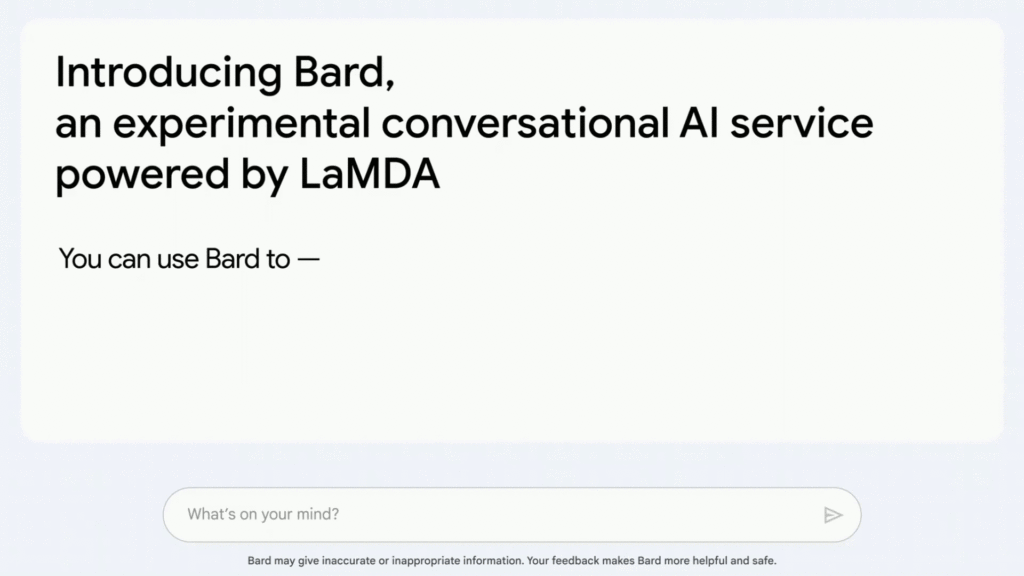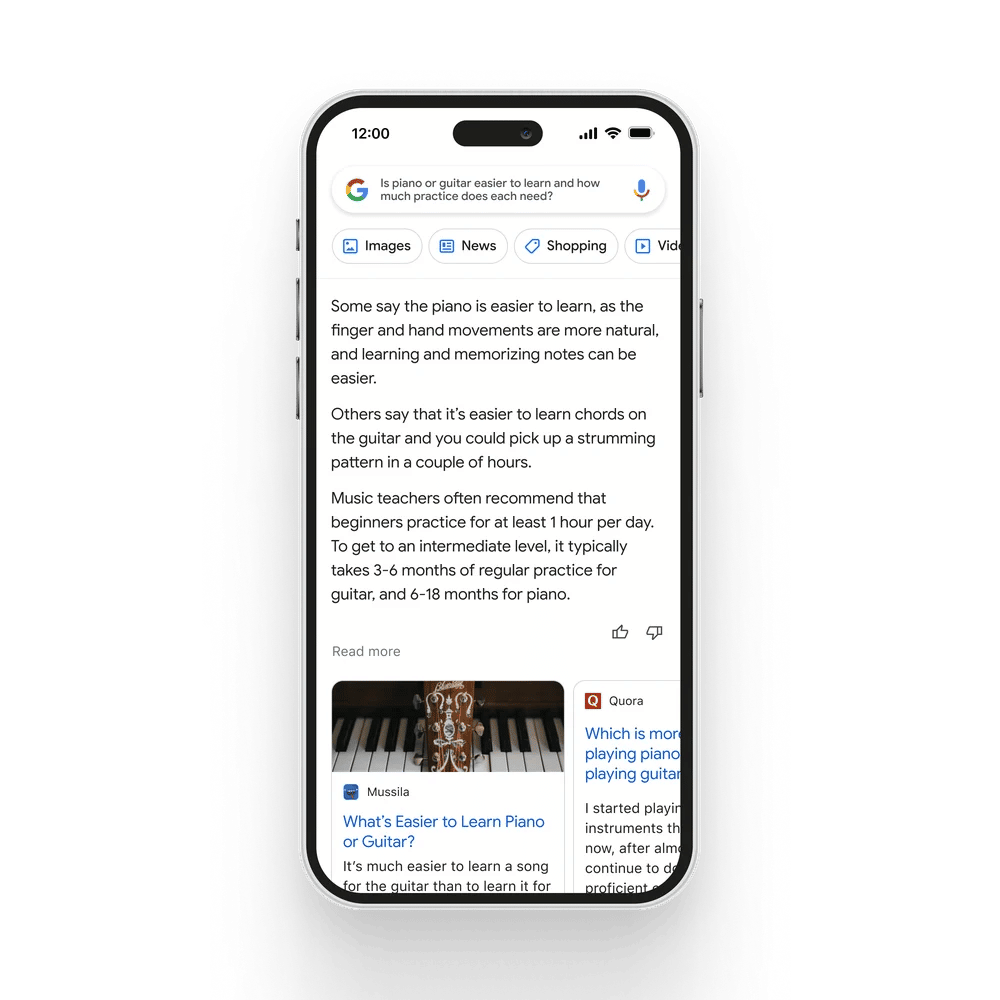Today Google made a major announcement that has been expected for weeks, they are launching an artificial intelligence chatbot in the search results. Currently, this chatbot is only available to “trusted testers” (whatever that means) but will be publicly available soon possibly on February 8th when they are scheduled to make an announcement.
I have been predicting this since around 2011 when I also predicted smart speakers, I have also given talks on this subject at conferences (notably the 2017 HIMA conference in Houston, TX where a Google employee validated my statements), and wrote about how one incarnation of such a bot might look when I wrote about Google no longer being a search engine in 2018. The reality is that what Google is doing is trying to scrape/take content from the web and use it for their own gain without paying or sending traffic to websites (i.e. steal). This may have disasterous consequences for search and for the architecture of the web as we know it today. But, it all depends on how consumers adopt the technology and how this technology enables Big Tech companies to generate revenue (or more revenue).
Here is everything we know about Bard and how it may or may not impact search as we know it.
1. Bard (also being called “Apprentice Bard”) is a conversational A.I. which is a fancy way of saying it is a language model you can talk to. Language models are not intelligence, but complex probability mathematics that predict what words or phrases are appropriate in a given context.
2. The chatbot is based on Google’s LaMDA language model which stands for “Language Model for Dialogue Applications”
3. Bard uses fresh data from the web versus ChatGPT which uses a dataset from 2021 and appears to only cover select parts of the web. “It draws on information from the web to provide fresh, high-quality responses.” – Sundar Pichai, Google CEO
4. Bard is integrated into the search box. When you type a question or query Bard might be triggered and respond. In some cases (see screenshot below) Bard will write a full article in response just for you and bases this on various other articles from around the web.
5. In screenshots / videos shared by Google of Bard in action there are NO citations or references given, just text output highly similar to ChatGPT. That means Google could be using your content to generate answers for users (similar to their featured snippets) but without ever giving you any credit or helping traffic reach your website.
6. Starting off Bard is using a “lightweight” version of LaMDA which Google says will make it easier to scale. Essentially they are treating this as a test rollout and spending minimal additional resources on it.
7. Bard appears to be limited in what it will allow users to do / what it will respond to early on.
8. Google will keep adding features to Bard and/or more A.I. features to search results stating that “Soon, you’ll see AI-powered features in Search that distill complex information and multiple perspectives into easy-to-digest formats, so you can quickly understand the big picture and learn more from the web: whether that’s seeking out additional perspectives, like blogs from people who play both piano and guitar, or going deeper on a related topic, like steps to get started as a beginner. These new AI features will begin rolling out on Google Search soon.”
9. Bard is only available to a handful of users right now, but will expand to more users soon.
10. Google will be offering a Bard API for developers soon and ostensibly plans to offer APIs for other A.I. models too such as PaLM, Imagen, and MusicLM.
See Google’s Bard in Action
GIF / Video:
More Resources
- Google’s Announcement: An important next step on our AI journey
Frequently Asked Questions
Question: Will Bard or other A.I. chatbots kill search engines and SEO?
Answer: Most likely not. Imagine A.I. as an extreme amount of personalization on search results for a question you have asked. For example one thing Google said would be possible is explanining the findings of the James Webb Space Telescope to a 9-year old. While this does ultimately ‘steal’ traffic from the web publisher(s) who created the content and Google is simply using an advanced form of article spinning, it does not eliminate other consumer use of a search engine.
Question: Will consumers start using search more as a conversational chat experience now?
Answer: Maybe in the short term, but so far similar fads have faded out over a longer period. For example Google has had ‘conversational search’ since 2012 where you could say something like “who is the governor of Texas” and then next type “when is his birthday” and Google would display the birthdate for the current governor. By 2014 this was barely in use. Voice search is another similar trend and smart speakers / talking to a phone appear to have gone out of vogue so far. Google also used to personalize most of search results to a user, but now the personalization is typically either non-existant or fairly light.
Question: If A.I. chatbots are the future does this mean websites are useless?
Answer: Yes and No. It is theoretically possible as I have pointed out numerous time over the past decade, that a future type of engine could simply take content from websites and use it to generate responses without ever giving credit, link clicks, or other value to the host website that originated it. We have seen this with featured snippets where Google needs only to display a fact and many websites instead of fighting it like I urged back then instead embraced it because they thought it would give them higher rankings and overall more clicks. Now with a chatbot using crawled data from the web and an LLM to have a conversation with a user it is possible they never need to even provide a citation as you can see in the above Google provided screenshot and video of Bard. However, it doesn’t make long-term economic sense for these engines to tread that path or to ignore the pleathora of data provided by websites that could help determine quality. For example if Bard decides to simply start stealing news articles from CNN and rewriting them using its LLM and then displaying the appropriate snippets to users without sending the user to CNN, then in this interaction CNN makes no money. That means CNN would either go out of business or block Google’s bot from crawling their website and would leave the chatbot suffering from a news source. Extrapolate this process out over and over again several thousand times and you have an LLM capable of answering questions and having a conversation but being unable to access the live web. That would leave it to only use its own corpus which would get more and more stale as time passed and would become a massive cost-center instead of a profit-center. An alternative would be publishers filing a lawsuit over copyright infringment which would stand a decent chance of prevailing if it turned out the LLM was trained to use this content without their expressed consent.
So, while theoretical, it doesn’t make much practical sense unless Google’s Bard or other chatbot could secure the deals they need to use cotnent without attribution, store it using minimal effort/costs, and retrieve it with minmimal effort/costs.
I discuss both Yes and No responses in a Twitter thread here:
Question: Will Bard or other Google A.I. tools eliminate SEO?
Answer: No. As mentioned in the Twitter thread above language models are not suitable for a major task humans require when fulfilling a need – evaluation of alternatives. For this reason search will always exist in some context as long as we interact with the web using keywords and words. Chatbots and language model / generative A.I. are also not really great at answering all questions or providing the right responses. Finally, Google’s SERPs are today largely powered by A.I. generating the signals and interpretting them for the rankings. So technically A.I. is already part of SEO and has been since roughly 2013-2016.
Question: Can I use Bard to write articles for me?
Answer: As with our advice on ChatGPT for SEO, it does appear possible but you should treat this as rough draft or first draft and rewrite the article or write more.
Question: Can I use Bard to do SEO analysis for me?
Answer: That is not yet clear, but most likely not.
Question: Can I apply to get Bard access early?
Answer: No it does not appear so.


